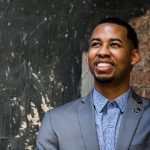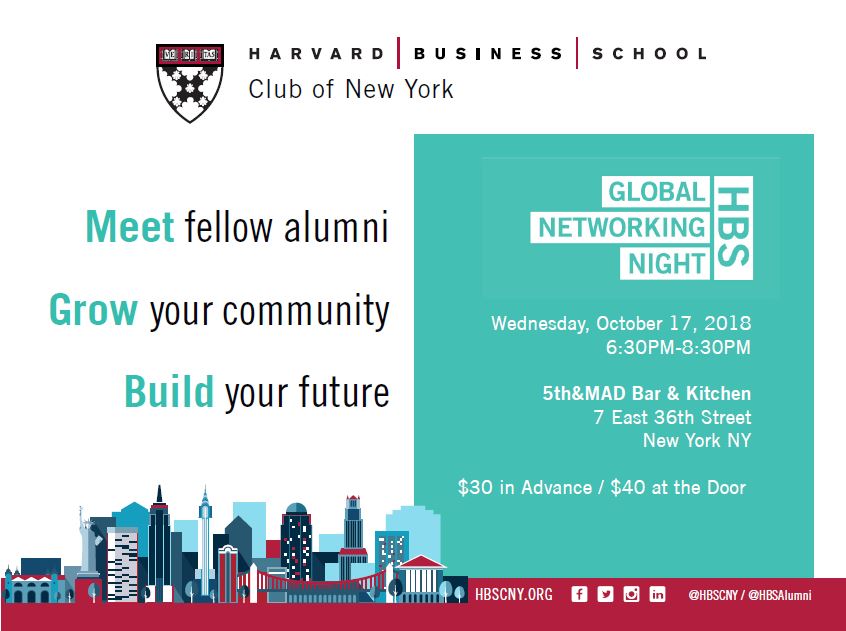
During the inaugural Harvard Business School Orientation in the Dark (OITD), hosted by the HBS Student Association’s (SA) Diversity and Inclusion Committee, 57 Harvard Business School students were blindfolded prior to their entrance into the Yu Chin room at Chao and placed into groups of six or seven peers.
“Introduce yourself,” Sara Minkara, founder of Empowerment Through Integration—a non-profit organization committed to achieving inclusion for all— announced. “Do not say your name, where you are from, where you went to undergrad, your work background, or your program year.” Students initiated this task at hand with some timidity.
Sara, who has been legally blind since she was seven years old, shared how she is inherently unable to form surface-level judgements of people, allowing her to connect with others without the societal filters upon which many at HBS are fully inclined to lean.
She proceeded, “I want you to learn to be comfortable with being uncomfortable. Embrace it. I want you to love it.” She engaged the group in simple yet profound questions to guide the conversation. In a matter of moments, students conversed with more surety, and perceived notions of race, class, gender, and status, beyond what could be extrapolated by voice, were symbolically out of sight and, consequently, out of the discussion.
With the blindfolds on, students recounted that they felt transformed: after some initial feelings of vulnerability due to their obstructed vision, participants became increasingly comfortable and, indeed, less inhibited. In turn, their authentic selves – rather than their constructed ones – shone through. They engaged in conversations about love, travels, hobbies, and family. Those who listened gripped intently to the speaker’s triumphs and obstacles, punctuating the presenter’s words with encouraging interjections, laughter, and sometimes silence. After ninety minutes, blindfolds were removed, and students were unable to hold back smiles. Many took deep breaths.
“I’ve been meeting people the wrong way,” Amy Hernandez (HBS ’20) reflected at the end of the event. “This is much more valuable. We can delve into who people truly are and what they believe in.”
Ceená Beall, Chief Diversity Officer of the HBS SA, echoed the significance of the exercise. “Building relationships at HBS can be the most rewarding part of this two-year journey, but it can also be the most challenging. Students are not only overwhelmed by the sheer quantity of people to meet, but are also worried about finding balance in the quality of relationships they establish,” noted Beall. “OITD participants had to put on a physical mask to share details about who they are behind the seemingly artificial masks we find ourselves wearing at HBS – masks which limit our ability to be vulnerable and transparent when connecting with others.”
“Through OITD,” Beall continued, “I hope seeds were planted so that people don’t build relationships based only on commonality of interests/background or an anticipated future benefit, but instead because they appreciate the incredible diversity and authenticity at HBS and are committed to making our community more inclusive.”
Beyond the overwhelmingly positive reactions from participants and guests, including Dean Nitin Nohria, an important question remains: What impact would scaling this approach have upon the HBS community? What would happen if we were to more regularly introduce ourselves in ways that transcended the typical, walk-me-through-your-resume rhetoric? One could imagine a resulting community that is more cohesive, more collaborative. Small-talk in between classes likely won’t get us there. But there are formats such as coffee chats, and community-wide events (MyTakes) that lend themselves to expressing genuine interest and concern for others and opening ourselves up to others. The way forward will require those to be courageous, to listen, and to share our personal stories, triumphs, fears and passions – without apprehension or fear of judgement.
In a gesture of continuing this discussion, I will take my first step forward:
“My name is Brandon Rapp. I lost a cousin to murder during my first year at HBS. I was not able to make it to the funeral, and it hurt, and I kept quiet about it. On the day of the funeral, as I scrolled through social media photos of family and listened to stories about the funeral from my mother, I thought deeply about inclusion, or the lack thereof, within economies, the workplace, and society, and what that meant for the ones whom I love. I wrestled with what would be my impact, and whether it would be enough to make a difference on the blocks from where I grew up and in the city where I was raised. Then, I decided to tackle the alternative question: what would be the impact upon the lives of family, friends, and community if I decide to do nothing for them?” And herein lies the truth, as I understand it now: I am here at HBS to continue this journey to create a more equitable, prosperous, inclusive, diverse, and safe world for my family, my hometown, and my friends. Because the fortunate reality for me and many is knowing that the decision to confront diversity, equity, and inclusion in and throughout our lives will positively impact those we care about deeply. And that is an outcome worth fighting for.”
Sara Minkara closed the Orientation in the Dark with these final, memorable words: “Building meaningful relationships is about loving all of who you are and creating the same space for others to love all of who they are.”
I encourage us to move past our wall of comfort, tell our stories openly and wholeheartedly, eliminate presumptions, and assume the absolute best in others.
 Brandon Rapp (HBS ’19) is a Contributor to The Harbus. After growing up in New Orleans, Louisiana, he attended Yale University and moved back to his hometown to teach at his high school alma mater. He then worked in economic and workforce development, tackling issues in emerging industries such as education, workforce training, small business development, entrepreneurship, reentry, and diversity and inclusion. Outside of enjoying playing basketball at Shad, he invests time on campus to converse on issues of racial equity, entrepreneurship, and holistic community and leadership development.
Brandon Rapp (HBS ’19) is a Contributor to The Harbus. After growing up in New Orleans, Louisiana, he attended Yale University and moved back to his hometown to teach at his high school alma mater. He then worked in economic and workforce development, tackling issues in emerging industries such as education, workforce training, small business development, entrepreneurship, reentry, and diversity and inclusion. Outside of enjoying playing basketball at Shad, he invests time on campus to converse on issues of racial equity, entrepreneurship, and holistic community and leadership development.


